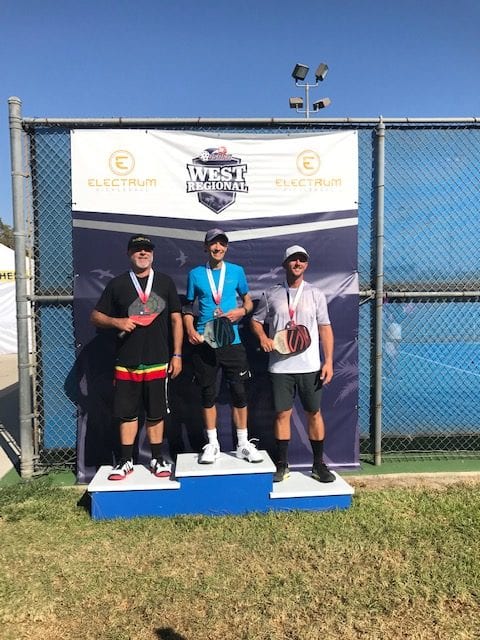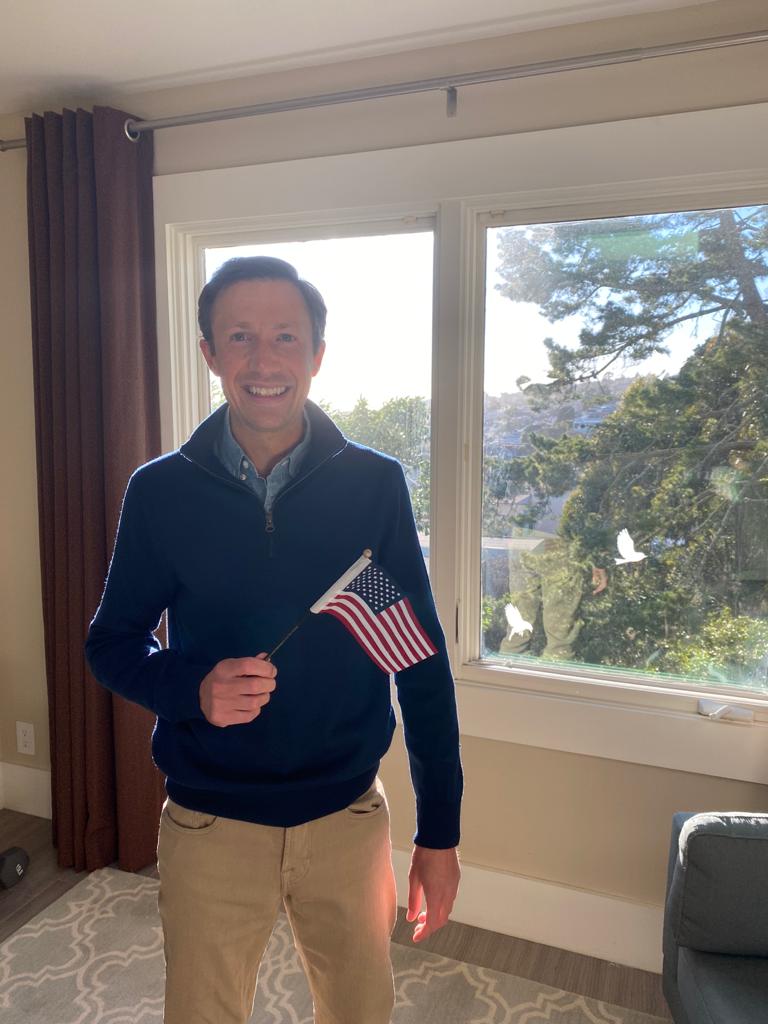
“Pickleball is the fastest growing sport in the country,” Paul Johnson told the Glen Park News on March 19.
Johnson, who has resided on Detroit Street for three years, emigrated to United States seven years ago from Pershore, England, a small town near Bristol. He founded and operates Lemonaid Health, an online health provider that employs 130 people across the United States.
Two years ago serendipity enriched his life, catapulting him to a professional pickleball ranking and national recognition as a top-tier player.
“I was walking in Glen Canyon, an absolute secret gem and where it’s hard to believe you’re in the middle of San Francisco, and I stumbled upon the Recreation Center’s gym,” he said, about the 70-acre natural area that reminds him of the English hedgerow-lined mid-lands. “I thought I go inside and have a look.”
He came upon three courts accommodating a dozen pickleball players.
“I’d never heard of pickleball before,” he continued, about a paddle sport played on badminton courts and utilizing a specially manufactured ball, “and the next thing I know I hear from a friendly voice, ‘come in and grab a paddle.’”
No stranger to courtside sports, Johnson accepted the entreaty and since has become a celebrated pickleball player, now at a level allowing him to participate in professional tournaments,
“My father used to say I played tennis before I could walk,” he said.
Exchanging a childhood tennis racket for a pickleball paddle was a no brainer, especially since Rec and Park has been so welcoming. Well before COVID-19 changed our lives, Glen Park Recreation Center had extended a hospitable hello to picklers, encouraging them to share the Rec Center gym with basketball, volleyball and badminton players. Since March 2020, with the closure of indoor facilities, pickleball has been outsourced to several outdoor City courts including Louis Sutter Playground in McLaren Park where two underutilized tennis courts have been transformed into six courts dedicated to pickleball.
While unable to use Glen Park’s indoor recreation facility — converted one year ago into an Emergency Child and Youth Care Center to provide a safe place for children of first responders, health care workers and essential City employees — Louis Sutter, Upper Noe, Stern Grove, and Presidio Wall Playgrounds each now provides a haven for pickleball players. Each adheres to courtside COVID protocols such as bringing sanitizers to use after touching surfaces, arriving and waiting wearing a mask, remaining six-feet from others, and even returning a ball by hitting it with a paddle or rolling it without touching it.

Used to roaming as far afield as Palo Alto and Concord to find players at his skill level and most recently, on December 4, 2020, to Newport Beach to compete in his first professional level tournament, Johnson is looking forward to volleying at Golden Gate Park’s new facility, the Lisa and Douglas Goldman Tennis Center that will house five pickleball courts.
Both Sutter and the Goldman courts bear evidence of the sport’s growing popularity, particularly engaging middle-aged and older men and women. In 2015 numbers showed that 68% of pickleball players were over 60 years in age. But Wellington Chen, who kickstarted the Rec Center paddle sport in 2017, told the Glen Park News the player demographic is becoming younger. When COVID hit one year ago. there was a surge of Friday night participants that spiked to 50 players or more an evening. The sport has become so popular that after a completed match, waiting courtside for a rematch often took an hour or more and before the March 2020 lockdown the Rec Center scheduled over six hours of pickleball a week.
“The increasing access to recreational facilities is encouraging,” said Johnson. “I spent my life playing tennis and now several days a week I find physical exercise, mental release, friendship, fun and community on outdoor pickleball courts that allow for both walk on and reservations.”
But it’s the Glen Canyon indoor gym closest to his Detroit Street digs that Johnson pines for. After he and his doubles partner competed against brothers Ben and Collin Johns — two of the most respected competitors in the country and won one game in a three-game match in December at the Newport Beach Tournament — Johnson acknowledges modestly his skills.
“When I began playing there several years ago I was one of the worst players,” Johnson said, adding self-deprecatingly, “A combination of tennis and a competitive zeal has made me a better player.”
His “best in show,” though, hasn’t prevented him from sharing a gym court with neophytes.
“The camaraderie among the Glen Park players is praiseworthy,” he said. “We structure the court play by skill levels, as we want to be seen as welcoming, not intimidating.”
Entering the pre-COVID gymnasium as often as twice a week or more, Johnson continued.
“Advanced players can still work on technique playing against a less skilled competitor,” he said. “I can work on my defense and my court angles, and each allows me to develop to another level.”
On February 25, Johnson momentarily put aside his pickleball paddle and picked up an American flag becoming an American citizen.
It involved studying civics books much as 16-year-olds scour the DMV Handbook, cramming for a Driver’s License exam.
Instead of an 18 question DMV test, however, the American citizenship examination is limited to 10 questions from a pool of one hundred. Instead of taking the test on a computer at a Fell Street building, Johnson challenged questions orally at the Federal Building on Sansome Street.
“The Immigration Service official asks 10 questions during an interview and you are expected to answer six correctly,” he explained.
Johnson aced the examination, answering each question spot on although he had a moment of panic.
“The examiner asked who was president during the First World War,” he said. “I took a stab and got it right.” [It was Woodrow Wilson for those who haven’t been studying up.]
“I took my oath of allegiance at the naturalization ceremony and was granted my American citizenship,” he said. Normally the ceremony occurs a few days or weeks after the interview because friends and families are hosted in an Oakland theater. Because of COVID restrictions, though, the event took place in the Federal Building without guests.

Twelve people raised their right hands that day from all over the world.
“When the ceremony was over,” he said, “I was handed an American flag and I became a bit emotional!”
Johnson’s first official sanctioned pickleball tournament was the West Regional Pickleball Tournament in Southern California on September 18, 2019. He came away winning a gold in the singles competition at the 4.5 level, the second to highest level. He’s photographed on the celebratory stand, receiving his medal. Standing elbow-to-elbow next to him are the silver and bronze winners.
As significant as that tourney was and the subsequent Newport Beach Tournament just three months ago, what occurred in San Francisco on February 25, when he stood shoulder-to-shoulder with a dozen other freshly anointed American citizens rivaled, if not surpassed, Newport Beach in importance.
“I felt extremely proud the moment I became an American,” he said. “I moved to the U.S. in 2013 to found Lemonaid Health that makes health care more affordable and accessible. Over the last seven years Glen Park and California have become my home and my life has been built around the fantastic community in San Francisco.”
“Becoming a citizen solidifies my time here,” Paul Johnson said, “emotionally making me feel like this truly is my home and that I belong.”